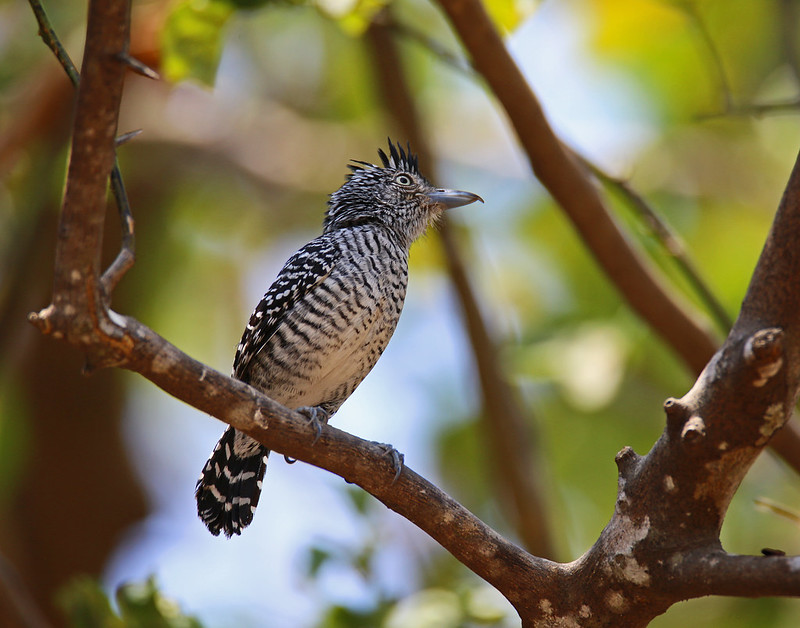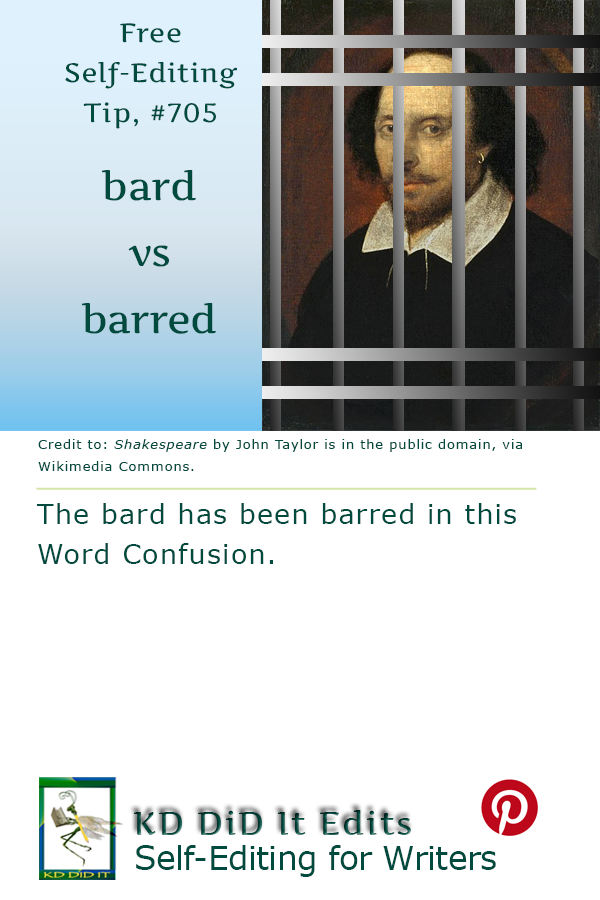Revised as of
22 Oct 2022
With fall, teachers start breaking out that Shakespeare, and so many students wish the bard were barred from their coursework . . . sigh . . .
Did I mention that this word confusion pair is an heterograph (a subset of homophone)?
You may also want to explore “Bar vs Barre vs Barre“.
Word Confusions . . .
. . . started as my way of dealing with a professional frustration with properly spelled words that were out of context in manuscripts I was editing as well as books I was reviewing. It evolved into a sharing of information with y’all. I’m hoping you’ll share with us words that have been a bête noire for you from either end.
If you found this post on “Bard versus Barred” interesting, consider tweeting it to your friends. Subscribe to KD Did It, if you’d like to track this post for future updates.
You may also want to explore “Bar vs Barre vs Barré“.
| Bard | Barred |
|---|---|
|
Dresdner Zwinger, 16th or 17th Century Armour and Weapons by Ingersoll is in the public domain, via Wikimedia Commons. — A sixteenth-century knight with a barded horse. |

Barred Antshrike (male) by vil.sandi is under the CC BY-ND 2.0 license, via VisualHunt. |
| Part of Grammar: | |
| Noun 1, 2; Verb, transitive 2 Plural for the noun: bards Third person present verb: bards Alternative spelling 2: barde, barding, barb |
Morpheme: bar
Adjective 1; Verb 2, transitive Third person present verb: bars |
| Noun: [Archaic or literary] A poet, traditionally one reciting epics and associated with a particular oral tradition 1
One of an ancient Celtic order of composers and reciters of poetry, usually about the exploits, often legendary, of their tribes [Today] A poet who wins a verse competition at a Welsh eisteddfod [Armor] Any of various pieces of defensive armor for a horse 2 [Cookery] A slice of bacon placed on meat, game, or poultry before roasting to prevent its drying out while cooking Verb, transitive:
[Cookery] To secure thin slices of fat or bacon to a roast of meat, game, or poultry before cooking |
Adjective: Provided with one or more bars 1
[Ornithology; of feathers] Marked with transverse bands of distinctive color Verb, transitive:
Prevent or prohibit someone from doing something or from going somewhere
Mark (something) with bars, stripes, or bands |
| Examples: | |
| Noun: Robert Burns was renowned as the national bard of Scotland in the 18th century. He was admitted as a Bard at the National Eisteddfod. Thomas Moore was an early 18th century bard and contemporary of Lord Byron’s. Back in the day, bards traveled from village to village, performing and telling stories. Shakespeare is commonly recognized as the Bard of Avon. Horse bards became essential as armies adapted to the effectiveness of knights in armor. “Don’t touch that!” mother exclaimed, as she went on to explain, “That bard is for the venison.” Verb, transitive: Barding the roast holds in the moisture and imparts a slight flavor of the fat. Bard the pheasant in two or more strips of fat to protect the meat from drying out. |
Adjective: His view was through a barred prison window. These barred fabrics give it a modern look while adding color. Barred owls usually don’t move farther than six miles away. Verb, transitive: Journalists had been barred from covering the elections. Boulders barred her passage. The job she loved had been barred to her. Nothing is barred in the crime novel. The judge ordered the witness barred from the courtroom during the trial. His face was barred with light. |
| Derivatives: | |
| Adjective: bardic, bardish, bardlike Noun: bardism, bardolater, bardolator, bardolatry, bardship |
Adjective: barless, barrable, unbarrable Noun: bar, barring Preposition: bar |
| History of the Word: | |
|
|
C’mon, get it out of your system, bitch, whine, moan . . . which words are your pet peeves? Also, please note that I try to be as accurate as I can, but mistakes happen or I miss something. Email me if you find errors, so I can fix them . . . and we’ll all benefit!
Satisfy your curiosity about other Word Confusions on its homepage or more generally explore the index of self-editing posts. You may also want to explore Book Layout & Formatting Ideas, Formatting Tips, Grammar Explanations, Linguistics, Publishing Tips, the Properly Punctuated, Writing Ideas and Resources, and Working Your Website.
Resources for Bard versus Barred
Apple Dictionary.com
Pinterest Photo Credits:
Shakespeare by John Taylor is in the public domain, via Wikimedia Commons.


